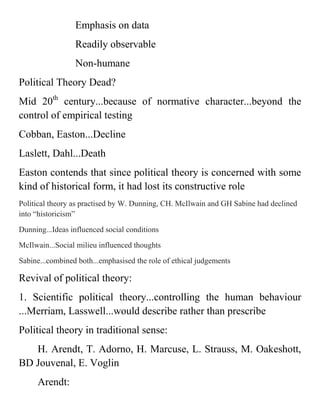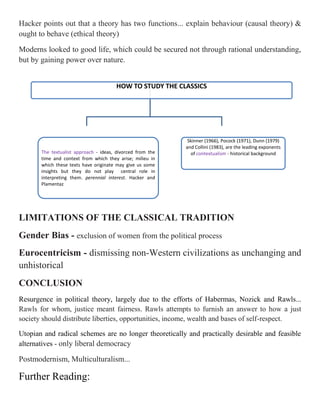Introduction to Political Science
- 1. Introduction Knowledge...wisdom Knowledge: Natural world - Science; Social world – Social Science; Social Sciences: Political Science, Sociology, Economics... Political Science Politics – Cooperation and Conflict...political entities, values; Power/authority; State/Government; Political institutions, phenomenon...behaviour...structure...function...process...system Political Thought Political Theory Political Philosophy Political Ideology –Detailed program to attain the end
- 2. Key concepts in PT Why key concepts? 1.Ontology...What 2.Epistemology...Methodology...How 3.Empiricism: attempt to tie knowledge to experience by the use of the senses; Locke, Berkeley, and Hume; closely related term pragmatism 4.Rationalism: innate or intuitive knowledge or general principles gaining credibility simply through the use of reason; Plato, Descartes, Leibniz, and Spinoza 5.Fact: empirically verifiable...quantify 6.Value: difficult…what is important in life...qualitative 7.Idealist: Permanent immutable Ideas – reality to adjust…Plato 8.Realist/Materialist: Ideas are derived from material reality…Locke 9.Inductive: P2G - makes broad generalizations from specific observations 10. Deductive: G2P…Conclusion derived from premises 11. Deontology: irrespective of outcome...based on action right/wrong...Kant, Rawls 12. Teleology: based on outcome... right/wrong...; the doctrine of design and purpose in the material world. 13. Subjective: personal 14. Objective: impartial 15. Positivism:
- 3. Positivism is the name for the scientific study of the social world. Its goal is to formulate abstract and universal laws on the operative dynamics of the social universe...based on Verification; Auguste Comte Logical Positivism: A form of positivism, developed by members of the Vienna Circle, which considers that the only meaningful philosophical problems are those which can be solved by logical analysis; based on Verification Metaphysics (Meta means „beyond‟) is the study of those things and phenomena that are beyond the physical realm. It is a philosophy that concerns the nature and description of an ultimate reality that stands behind the physical world or the world of appearances. The metaphysical statement usually implies an idea about the world or the universe, which may seem reasonable but is ultimately not empirically verifiable, testable or provable. 16. Reductionism It involves actually breaking the system into its parts and studying the parts‟ behaviour in isolation under controlled conditions. Political Theory – for what?...To have order in the society History of Political Thought Technique of Analysis/Conceptual clarification Governing Institutions in the society
- 4. Power equations in the society Questions of Justice, liberty… Formal Model building Political processes, Political behaviour Further Reading: https://www.oxfordreference.com/view/10.1093/oi/authority.20110 803100405393 https://www.oxfordreference.com/view/10.1093/oi/authority.20110 803095750220 https://www.sciencedirect.com/topics/social-sciences/positivism
- 7. Intellectual influences responsible for the decline of Traditional Political Theory (normative) 1.Positivism 2.Logical Positivism 3.Karl Popper‟s...principle of falsification...also opposed to any form determinism... 4.Linguistic philosophy...philosophers lack influence on politicians...but that is not true 5.Behaviouralism - Cobban, Easton, Waldo Strongly influenced by positivism - started in the early 19th century – became clear in the 1950s & 1960s– emphasised pure science of politics – preferred factual & statistical enquiries – Reductionism – 8 major tenets: PRIST VVQ; Pure science; Regularities; Integration; Systematization; Techniques; Verification; Values; Quantification; Values: Ethical evaluation and empirical explanation involve two different kinds of propositions that, for the sake of clarity, should be kept analytically distinct … https://thefinancialexpress.com.bd/views/behaviouralism-in- the-analysis-of-politics-and-society-1511965625 https://oxfordre.com/view/10.1093/acrefore/9780190846626.001 .0001/acrefore-9780190846626-e-376/version/0 Criticism: Mindless empiricism Inductive
- 8. Emphasis on data Readily observable Non-humane Political Theory Dead? Mid 20th century...because of normative character...beyond the control of empirical testing Cobban, Easton...Decline Laslett, Dahl...Death Easton contends that since political theory is concerned with some kind of historical form, it had lost its constructive role Political theory as practised by W. Dunning, CH. McIlwain and GH Sabine had declined into “historicism” Dunning...Ideas influenced social conditions McIlwain...Social milieu influenced thoughts Sabine...combined both...emphasised the role of ethical judgements Revival of political theory: 1. Scientific political theory...controlling the human behaviour ...Merriam, Lasswell...would describe rather than prescribe Political theory in traditional sense: H. Arendt, T. Adorno, H. Marcuse, L. Strauss, M. Oakeshott, BD Jouvenal, E. Voglin Arendt:
- 9. The Human Condition... Focus was on the uniqueness and responsibility of the individual human being with which she initiated her criticism of Behaviouralism...its search for uniformities Oakeshott Multidimensionality-Experience and its Modes- hi story, science, practice and poetry. Science concerned itself with measurement and quantification, history with the past, practice with an act of desiring and obtaining, and poetry with imagination and contemplation. Political philosophy to remove the crookedness in our thinking Arendt & Oakeshott: Political philosophy did not to promise salvation...politics...continuous activity... Political theory...not ideology, utopian scientific methodology...but an experimental science of the right order in both the individual and society Stauss: reaffirmed the importance of classical political theory...nihilism not acceptable...Strauss resembles Voegelin in that he also is seeking to recover political ethics as an objective science accessible to human reason The Straussian approach to politics was the focus on the "philosophic dimension" of statecraft, often at the expense of mass behavior or interest- group politics that attracted the attention of mainstream of political science. The Frankfurt School, to which Adorno and Marcuse belonged, emerged in Germany in the 1920s and attracted some of the best minds of contemporary German social sciences. The works of the members of the school were recognized as a distinct category under the term critical theory. They were opposed to all forms of positivism and were critical of any possibility of a value-free social science. Kolakowski...6 basic characteristics of Frankfurt School...
- 10. 2. Berlin‟s view Started as a logical positivist but later developed critical response towards that Freedom & Pluralism Positive liberty...freedom to act... Negative liberty... freedom from interferences 3. Wolin‟s defence of the classical political tradition Futuristic quality...political order Public concern... Evolving grammar and vocabulary to facilitate communication Kuhn‟s seminal contribution With respect to natural science, in every age a discipline solved some of its problems but in the process generate new ones...however this may true to social sciences Paradigm...is to selection of problems and finding solutions Post-behaviouralism & Neo-behaviouralism Pre paradigmatic Paradigmatic Crisis Scientific revolution
- 11. 1969 Easton – announced Post-behaviouralism: less emphasis on scientific method and more stress on public responsibilities... Tenets of post-behaviouralism...6... students have to do The possibility of different theories yielding different observations Revival of interpretive understanding and historical analysis New concerns such as feminism, environmentalism, ethnicity, racial identity and equality and nuclear war have emerged WHY IS THE CLASSICAL TRADITION IMPORTANT? “Classics”, address both local issues and contain principles of universal significance Rival conceptual frameworks (Ex: Plato vs. Aristotle) which enable us to choose and state our preference Political theory normally taken place during periods of acute crisis - comprehended and articulated the spirit and temper of events... the desirable thing to happen. A political theory must contain three elements: students have to do The great classics were composed by political exiles or by failed politicians like...examples? Plato and Aristotle Sought to recreate pre-eminence of the Greek city states or the polis Machiavelli Focused on Italian unification & emerging commercial society Hobbes and Locke Addressed crisis of political authority in times of English civil war Germino identifies the seven characteristics of an authentic political theory...what they are?
- 12. Hacker points out that a theory has two functions... explain behaviour (causal theory) & ought to behave (ethical theory) Moderns looked to good life, which could be secured not through rational understanding, but by gaining power over nature. LIMITATIONS OF THE CLASSICAL TRADITION Gender Bias - exclusion of women from the political process Eurocentricism - dismissing non-Western civilizations as unchanging and unhistorical CONCLUSION Resurgence in political theory, largely due to the efforts of Habermas, Nozick and Rawls... Rawls for whom, justice meant fairness. Rawls attempts to furnish an answer to how a just society should distribute liberties, opportunities, income, wealth and bases of self-respect. Utopian and radical schemes are no longer theoretically and practically desirable and feasible alternatives - only liberal democracy Postmodernism, Multiculturalism... Further Reading: HOW TO STUDY THE CLASSICS The textualist approach - ideas, divorced from the time and context from which they arise; milieu in which these texts have originate may give us some insights but they do not play central role in interpreting them. perennial interest. Hacker and Plamentaz Skinner (1966), Pocock (1971), Dunn (1979) and Collini (1983), are the leading exponents of contextualism - historical background














